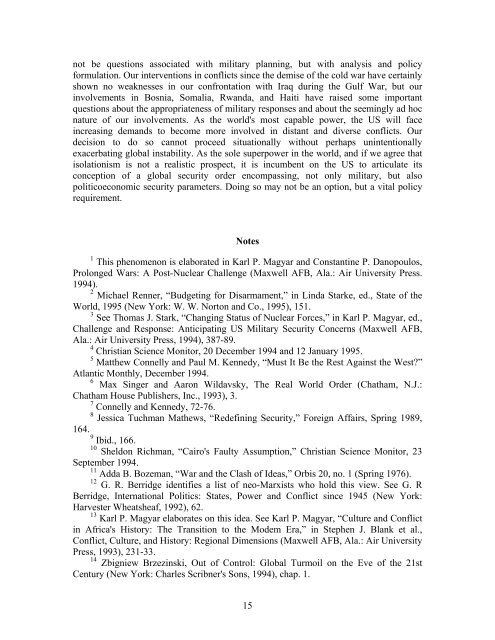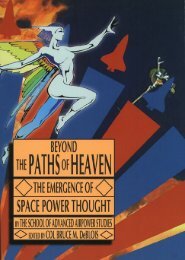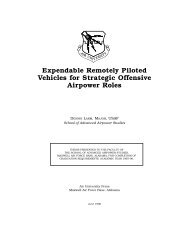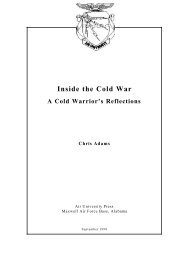Global Security Concerns - Project Gutenberg Consortia Center
Global Security Concerns - Project Gutenberg Consortia Center
Global Security Concerns - Project Gutenberg Consortia Center
You also want an ePaper? Increase the reach of your titles
YUMPU automatically turns print PDFs into web optimized ePapers that Google loves.
not be questions associated with military planning, but with analysis and policy<br />
formulation. Our interventions in conflicts since the demise of the cold war have certainly<br />
shown no weaknesses in our confrontation with Iraq during the Gulf War, but our<br />
involvements in Bosnia, Somalia, Rwanda, and Haiti have raised some important<br />
questions about the appropriateness of military responses and about the seemingly ad hoc<br />
nature of our involvements. As the world's most capable power, the US will face<br />
increasing demands to become more involved in distant and diverse conflicts. Our<br />
decision to do so cannot proceed situationally without perhaps unintentionally<br />
exacerbating global instability. As the sole superpower in the world, and if we agree that<br />
isolationism is not a realistic prospect, it is incumbent on the US to articulate its<br />
conception of a global security order encompassing, not only military, but also<br />
politicoeconomic security parameters. Doing so may not be an option, but a vital policy<br />
requirement.<br />
Notes<br />
1 This phenomenon is elaborated in Karl P. Magyar and Constantine P. Danopoulos,<br />
Prolonged Wars: A Post-Nuclear Challenge (Maxwell AFB, Ala.: Air University Press.<br />
1994).<br />
2 Michael Renner, “Budgeting for Disarmament,” in Linda Starke, ed., State of the<br />
World, 1995 (New York: W. W. Norton and Co., 1995), 151.<br />
3 See Thomas J. Stark, “Changing Status of Nuclear Forces,” in Karl P. Magyar, ed.,<br />
Challenge and Response: Anticipating US Military <strong>Security</strong> <strong>Concerns</strong> (Maxwell AFB,<br />
Ala.: Air University Press, 1994), 387-89.<br />
4 Christian Science Monitor, 20 December 1994 and 12 January 1995.<br />
5 Matthew Connelly and Paul M. Kennedy, “Must It Be the Rest Against the West?”<br />
Atlantic Monthly, December 1994.<br />
6 Max Singer and Aaron Wildavsky, The Real World Order (Chatham, N.J.:<br />
Chatham House Publishers, Inc., 1993), 3.<br />
7 Connelly and Kennedy, 72-76.<br />
8 Jessica Tuchman Mathews, “Redefining <strong>Security</strong>,” Foreign Affairs, Spring 1989,<br />
164.<br />
9 Ibid., 166.<br />
10 Sheldon Richman, “Cairo's Faulty Assumption,” Christian Science Monitor, 23<br />
September 1994.<br />
11 Adda B. Bozeman, “War and the Clash of Ideas,” Orbis 20, no. 1 (Spring 1976).<br />
12 G. R. Berridge identifies a list of neo-Marxists who hold this view. See G. R<br />
Berridge, International Politics: States, Power and Conflict since 1945 (New York:<br />
Harvester Wheatsheaf, 1992), 62.<br />
13 Karl P. Magyar elaborates on this idea. See Karl P. Magyar, “Culture and Conflict<br />
in Africa's History: The Transition to the Modem Era,” in Stephen J. Blank et al.,<br />
Conflict, Culture, and History: Regional Dimensions (Maxwell AFB, Ala.: Air University<br />
Press, 1993), 231-33.<br />
14 Zbigniew Brzezinski, Out of Control: <strong>Global</strong> Turmoil on the Eve of the 21st<br />
Century (New York: Charles Scribner's Sons, 1994), chap. 1.<br />
15






